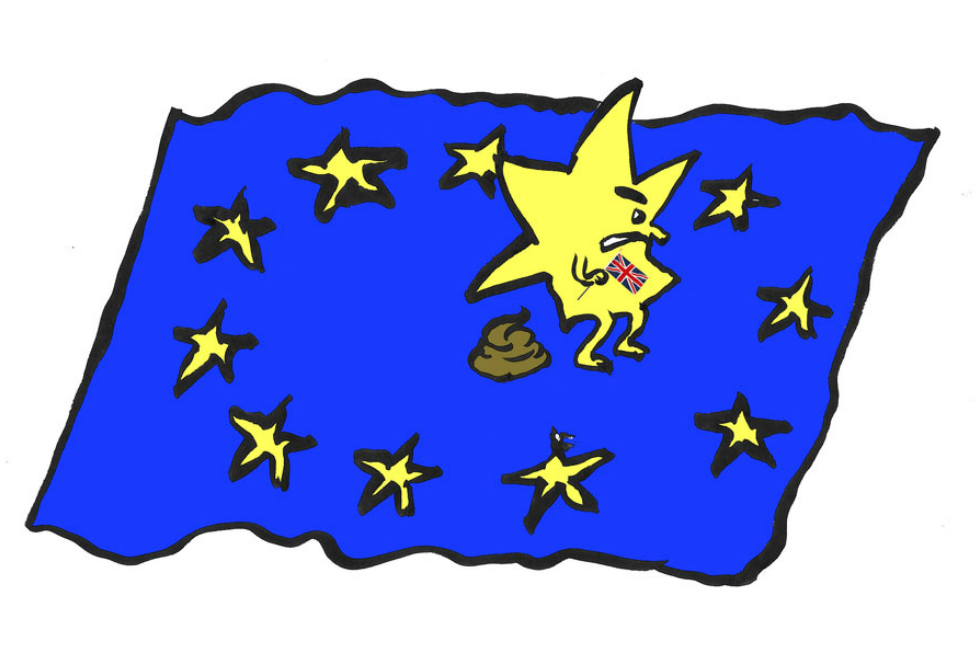Should We Stay or Should We Go? | Frieze

Our editor Laura Robertson — alongside writers, artists, directors and curators including Damien Hirst, Sally Tallant, Iwona Blazwick, Hans Ulrich Obrist and Cornelia Parker – presents her opinion on the impending EU referendum for Frieze magazine…
We’ve been here before. In fact, in regards to some human behaviours, it’s hard to distinguish between the Europe of now and the Renaissance period (14-17th century). Thrilling new discoveries in science and technology, and new ideas across philosophy and the arts, led to the Enlightenment; equally, huge changes left many disillusioned, conflicted and angry. Alongside the creative visionaries of the era, like Leonardo da Vinci, political provocateurs rose to prominence, like Martin Luther, who took advantage of rife uncertainty to ignite religious war. Sound familiar? How else could the Bonfire of the Vanities – the gleeful destruction of books, paintings and musical instruments deemed immoral – happen in Florence, Italy: the very heart of European culture? An event that seemingly contradicts a rise in intellectual debate and scientific questioning?
Fast-forward to the present day: relatively recent technological leaps mean we have human beings working in space and communicating their experience to everyone on Earth, in real time. We have the highest ever life expectancies; widening participation in the best education; transformative developments in medicine; access to and information on every part of the world and the known universe.
And yet …
And yet fascism is on the rise. We want to put walls up, divide communities and withdraw from wider society. Britain looks to remove itself from the very union that was set up to make sure that Hitler’s Third Reich would never happen again. Some of us are destroying the arts; ISIS smash ancient artefacts in Syria and anti-Semites vandalize Anish Kapoor sculpture in France. Football is usurped by neo-Nazis. Where they have burned books, said journalist Heinrich Heine in the 19th century, they will end in burning human beings. Is this where we are heading?
On Tuesday, I listened to Chris Kutarna speak at an event. The co-author of Age of Discovery: Navigating the Risks & Rewards of Our New Renaissance and a Fellow at Oxford Martin School, Kutarna believes that we are seeing remarkable similarities between the conflicts of first Renaissance and the 21st century. He calmly, terrifyingly, told us that patterns in history suggest Donald Trump will become President of the USA. That the UK will leave the EU. History, indeed, repeats itself. When people feel divided and vulnerable – as they so acutely do now, in the face of extreme poverty and extreme wealth, drone warfare, migrant boats, big brother surveillance and climate change – they blame each other. They pull up the drawbridge, lock the doors. People in hard right politics feed that fear and encourage division.
Unless…
Unless we do something about it.
On Saturday, I watched alongside millions of others as astronauts Tim Peake, Yuri Malenchenko and Tim Kopra returned to Earth from the International Space Station. Their car-sized metal capsule burned dramatically through the atmosphere, before parachuting gently through the clouds onto the vast Kazakhstan tundra. Many astronauts have spoken about how small Earth looks from the outside; how exquisitely beautiful and fragile this one planet appears. How the experience of space travel – made possible only by the collaboration of multiple countries – exposes the pettiness of human politics. After seeing Earth as a pale blue dot through the lens of Voyager 1, Carl Sagan famously noted: ‘There is perhaps no better a demonstration of the folly of human conceits than this distant image of our tiny world.’
It might seem like important decisions are out of our hands. That history dictates. That we’re powerless to instigate real change. But that’s not the case at all. We may have been here before, but we don’t have to repeat the same, old mistakes. You have the democratic right to make your voice heard: to vote and to be counted. This is why you must use your vote on Thursday to remain in the EU.
Say no to the divide and conquer politics of the Leave campaign. Stand up against apathy, fear, anger and disillusionment. Stand up for and defend true unity, progress, and empathy. Think about the achievements we can make – and have made – when we act as one, united Europe in one, united world.
Laura Robertson for Frieze
Image courtesy Mick Peter for Frieze; an artist who lives in Glasgow. Earlier this year, he had a solo show at the Drawing Room, London. Re-published with permission from Frieze
Place your vote in your local area on Thursday 23 June 2016 between 7am and 10pm
Still undecided? See EU Referendum: information from the UK government, and all you need to know via BBC News





